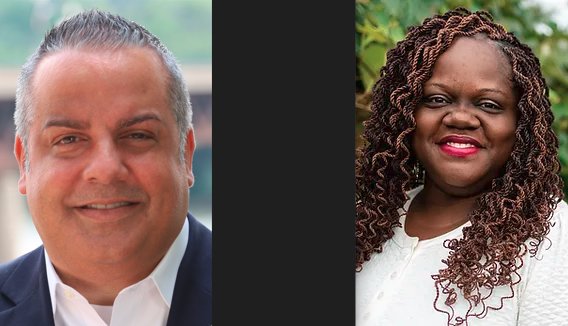
Democrat Lea Webb had a 2,000-vote lead over Republican Richard David in the race for the 52nd State Senate District, which includes Cortland and Tompkins counties, with only five election districts left to report.
Webb led, 51,027 to 49,034, with 217 of 22 districts reporting, the state Board of Elections reported early this morning. Cortland County went to David, taking 7,769 votes or 56.77% of the 13,685 votes cast in the county.
“The race is razor thin,” David’s campaign manager Benjamin Federman said Tuesday night. “Rich won’t be speaking to media tonight. Absentee ballots still need to be counted.”
In a call to Lea Webb’s campaign manager, Loren Couch, cheers could be heard through the receiver.
"Our goal was simple: to uplift the voices of working people in our community who, for years, have gone ignored or overlooked. I've said many times throughout this race that my campaign is not about me, and maintain that belief tonight," Webb said in a statement. "It was always about creating a movement, a people-powered movement, so that upstate communities can get the resources that they deserve."
Webb served eight years as a Binghamton city council member; David served eight years as its mayor.
Webb, a Broome County native, worked in public service since she was 15, focusing on social justice and healthcare.
David moved to Binghamton in 1998, and was its mayor from 2014 to 2021.
In interviews during the campaign, the candidates both saw the lack of access to childcare in the district as a barrier for people entering the work force.
“Childcare is a major economic issue, even from my own experience and working with residents in the district who gain employment, but then have to pay significant costs for childcare,” Webb said.
“We talk about the barriers of doing business and childcare is another one of the things we have to fix to get people back in the workplace,” David said.
Both candidates offered ways to improve broadband access in the district.
“When I was mayor we worked with some of our federal stimulus funds to work with providers to help address some of the rural broadband needs in Broome county,” David said. “I think that's a good approach that could be replicated in Cortland.”
“This pandemic serves as a massive mirror showing disparities that exist in our communities,” Webb said. “Internet access is a major one and our dependence on it has grown significantly. It's an issue that impacts rural and urban communities alike, and I would not only provide infrastructure, but also support ongoing funding for that.”
Opioids use was also a priority for both candidates.
“The state was awarded $208 million to put toward rehabilitation,” David said. “We need to make sure the state distributes the funds equally, especially to communities here in the Southern Tier.”
“Not only in District 52 but across the country this is a pervasive issue,” Webb said. “I think a resource that would help address that is extending funding to local providers and health practitioners who work with folks who are struggling with addiction and mental health issues.”